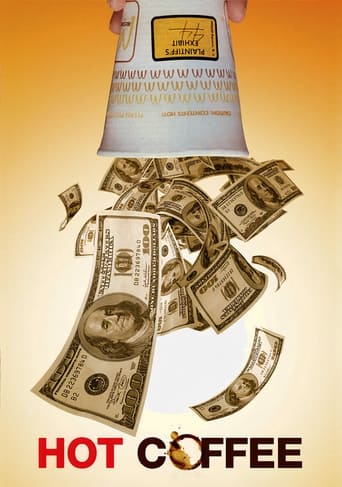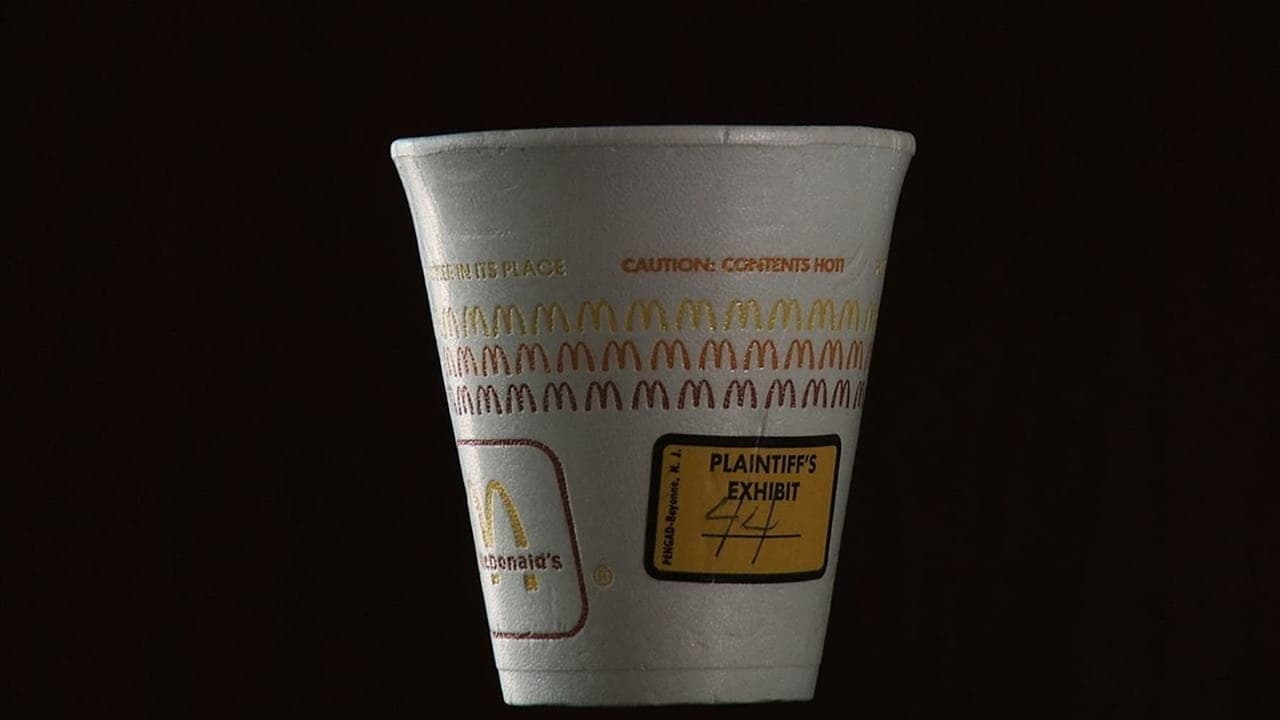KineticSeoul
Documentaries like this shows how important empathy and trying to understand things from the other side's point of view is. Sure, when people hear something ridiculous we are quick to jump the gun and come to an accusation. When I was in high school and heard of the hot coffee incident, I found the whole story to be dumb, and judged the victim as well. Now, getting more information on what really went down I actually feel for the old lady and wonder why she didn't get compensated more for the damages. Yeah, she dropped hot coffee on herself by accident, but it was the companies negligence that really did damages to the victim. The hot coffee incident is just the front and it delves into other incidents where victims stories got mislead and overblown by the media. Some of these stories made me upset and ticked off, especially when it came to the story about a woman that got raped, humiliated, physically damaged and locked in a cargo box. This documentary gives a in-depth view on how people with money and power can control and manipulate the message when given to the public. Sure, people can just try to sue people for some easy money. However even the tort reform can be taken advantage of by the people with power to take advantage of the poor or be used to run from their mistakes in a lot of cases. Even the people that know the system can try to get away, instead of paying for their crimes. I wouldn't be surprise if there is more people taking advantage of the tort reform over suing people in order to win some easy money. I give this movie an 8/10 because at few points it did seem to be biased. Besides that I think this is a informative documentary on perception and the court system.8/10
Tss5078
Like most documentaries, Hot Coffee uses a sample size of cases in the minority to push it's own agenda. The focus of the film is on tort reform and how it hurts people who have been legitimately injured. Tort laws put caps on the amount of money that an injured party can get, in certain types of lawsuits, for the purpose of stopping what the government considers to be frivolous claims. The documentary focuses on five specific cases and brings up the old discussion on whether or not it's better to let ten guilty men go free, rather than to punish one innocent person. Yes, the people in these stories were legitimately hurt and didn't get a fraction of what they deserved, because of these laws, but they are the exception instead of the rule. The most notable case the documentary focuses on is the case in which an elderly woman sued McDonald's, after she spilled hot coffee on herself. It's a case most people would consider frivolous, until you actually hear the facts. The woman's legal team was able to show that she received third degree burns and almost lost her life, because McDonald's required their coffee to be kept at a ridiculous 190 degrees. The elderly woman won over two million dollars, but had her award capped due to tort laws and the result was barely enough money to cover her medical bills. As I said before, these cases are exceptions to the rule, and by compiling these exceptions, this documentary makes it appear as though innocent American's are being screwed on a daily basis, which isn't true. While some people unfortunately fall through the cracks, the film fails to mention all the fraud and non-sense that has been stopped by these laws, or how these laws have kept insurance costs down. The bottom line, anyone can push any agenda they want, as long as they find a few select examples that can make their case for them, but it doesn't mean that their claims have merit.
Steve Pulaski
Susan Saladoff's Hot Coffee concerns tort reform politics in the United States and the controversy surrounding such reform. The film is named after the infamous lawsuit that people have greatly shortchanged in its details, editorialized for their own amusement, or wrote off as senseless and that of little importance. The lawsuit is Liebeck v. McDonald's Restaurants, which was enacted when an elderly woman named Stella Liebeck spilled a cup of McDonald's coffee on her lap while sitting in the passenger seat of her nephew's car in the restaurant's parking lot. The cup, which was said to be at roughly 180 - 190 degrees Fahrenheit, left Liebeck with third degree burns and skin grafts to repair most of her lap.We're told a lawsuit was created by Liebeck not to draw attention to herself or to gain money, but to prevent such a thing from happening to other people. However, listen to the lawsuit - a woman sues a restaurant for coffee being too hot. The ideas to riff, play, and utilize it in ways to demand the wildest things are not that hard to come up with. The lawsuit in itself was the main kickstarter to proposed tort reform in the United States, which is when common law is changed or rewritten to put a restriction on the kinds of things the American public can sue for. It's not doubt that we've become a lawsuit-happy country in this day and age, but does that mean everyone's rights to do such should be restricted? Saladoff uses various cases to show how tort reform has affected America in a detrimental way. One of the cases involves the Gourley family, a middle class Nebraskan family who was stricken with hellish circumstances when one of their twin sons was born severely mentally handicapped due to malpractice. Lisa Gourley went to the doctor's when she noticed irregular movement of her twin boys during pregnancy. The doctor monitoring Lisa's pregnancy assumed she had two placentas, when she only had one, resulting in one twin, Connor, being born normally, and Colin, the other twin, born with little oxygen to his brain while in the womb. Colin's medical bills were obviously through the roof, causing major financial struggles with the family. They thought a malpractice lawsuit would take care of finances. Despite winning their case, the $5.6 million payout, which would've covered numerous medical expenses, was reduced to the $1.25 million payout cap Nebraska had in place, leaving the Gourley's with only a few hundred-thousand dollars after paying their lawyer fee. Caps on damages were set in place by tort reform.The other two cases, or proclaimed "exhibits," show a Mississippi justice named Oliver Diaz prosecuted due to the U.S. Chamber of Commerce's methods for Diaz's stance against tort reform. The final studies the case Jamie Leigh Jones v. Halliburton Co., examining mandatory arbitration after Jones was brutally gangraped on one of the company's assignments in Iraq and was then held in a shipping crate for twenty-four hours with no food or drink. Because of a lengthy contract the oil company Halliburton makes their employees sign, Jones could not sue because a rape lawsuit was voided by signing the contract to work at Halliburton.Belief in tort reform was a logical position to take after hearing about the McDonald's lawsuit, I believe. If you, like many others, heard the basic outline of a story that a woman spilled coffee on her lap and received $2.9 million from the company who sold her the coffee, you'd likely be pretty skeptical or even angry. It would be your tax dollars put to use on what seems to be a frivolous lawsuit. However, when details have light shined on them, magnifying other vital parts of the story (such as the third degree burns, the selflessness of the victim, the skin grafts), things begin to become clearer and maybe a lawsuit (regardless of the imminent payout) more understandable.Things began to become clearer to the corporations too, who realized they could be victim to the same immense payout of McDonald's. Organizations began turning up all over the internet and on Television, advocating for tort reform and an end to "senseless lawsuits." One association was called Citizens Against Law Abuse (CALA). CALA gave consumers the illusions that the group was on their side and made up of concerned citizens who didn't want their tax dollars wasted. However, CALA wasn't citizen-driven at all; it was corporation-driven. The association was created and paid for rightfully paranoid corporations that thought similar lawsuits would be the jurisdictional norm and that getting consumers to support a group like CALA would effectively make them feel like they were protecting their money when they were protecting the corporations instead.In an essence, corporations would encouraging Americans to support a form of politics that effectively limits their right to a trial. Because of groups like CALA and the American Tort Reform Association (ATRA), the concept of tort reform politics such as caps on damages and mandatory arbitration were furthered and the citizens were given the illusion that they were winning when they were actually losing big.Hot Coffee brings these points to light in a way that isn't didactic or overly-reliant on redundant exposition. It's also not a statistical documentary; one that beats you over the head with charts, graphs, and percentages seemingly trying to scare you more than attempting to inform you. In addition, the information is made accessible and understandable to most everyone, and the importance of the documentary isn't sacrificed by a filmmaker fighting for the camera. This is an intelligent documentary because it knows its subject inside and out and can communicate it to a large audience. That is, by definition, an extremely successful documentary. The only thing making it better is that it concerns an issue that many can relate to.Directed by: Susan Saladoff.
timmyj3
I watched "Hot Coffee" today and was looking forward to it. I enjoy documentaries a great deal. It started off on solid note by giving the full back ground on the famous McDondalds hot coffee case. Unfortunately it goes downhill from there.We are shown a family in Nebraska that had twins. One is born with severe brain injury due to a lack of oxygen because of one umbilical cord instead of two. The family is awarded 5.6 million but Nebraska's cap law limits the award to 1.25 million dollars. While a sad story I think many people would argue that it was a birth defect medical condition that caused the injury not malpractice by the doctor and hospital. The movie makes a point about the doctor having been involved in two previous law suits. OK, but tell us how many case the doctor has been involved with in total. Is this doctor 3 for 3 or 3 for 13,289?? It makes a difference in the overall credibility of the movie.The next case up is a Democratic Mississippi lawyer/politician named Mr. Diaz that ran for the state supreme court in 2000. He won the race but was out spent by outside political groups according to the movie. Mr. Diaz then obtained personal loans guaranteed by a lawyer friend that practiced cases in front of the state supreme court. Mr. Diaz was then indicted on Federal charges of bribery and tax evasion. He was found not guilty. Does this film maker really think a judge should be taking personal loan guarantees from a law firm that does business in front of him?? He then lost his 2008 re-election bid. We are now told that Karl Rove scary right wing groups are behind the money against Mr. Diaz. I am still not sure what the problem was here other than a Democrat lost a race. Oohh.We are pretty much off the tracks by now. We are treated to Presidents Bush and Reagan talking about frivolous lawsuits. Of course, they are portrayed in a condescending manner. We are then, shown a brave President Obama standing up to the American Medical Association group. We keep getting shown edited snippets of President Bush saying bad things about tort reform over and over. At this point the movie has really become a little unhinged. But, lets continue..The last case involves every lefties favorite boogeyman "Haliburton" A woman named Jamie Leigh Jones claims that she was brutally raped while housed at a Haliburton housing area in Iraq. I had not heard of this case until I was watching the film. Lets say it didn't really pass the smell test. The gist is that she signed an employment contract the limited her legal recourse to binding arbitration. Of, course this didn't work out well. Ms. Jones also has a history of untruthfulness. Her case has since been lost at two different court levels. But, her case is taken up by Minnesota Senator Al Franken. Enough said.The film also harps on the right wing "outside" money spent to promote tort reform. The gist that this money is bad, wrong, and evil (show Karl Rove again). No mention of any "outside" left wing groups supporting non tort reform. Even though just about every person interviewed that supports the films view is from "outside" groups with names like "Judicial Justice for all" (I made that up) but you get the point.After the film, I decided to find out who Susan Saladoff is and was. She practiced as a trial lawyer on the behalf of injury victims, medical malpractice, and product liability. No bias here. Wow. How can this film be even called a documentary? It is an info-mercial for left wing trial lawyer groups.One parting thing I would love to know, who funded this one sided mess of a movie. Wanna bet it is outside left wing groups pouring money into non tort reform??? Ya think. Remember the cornerstone of the film is the outside money being spent on tort reform is bad, really bad, really really bad.One other side note. Instead of capping the victims awards, how about capping the lawyers cut to maybe 3%. Just a thought.


 AD
AD






